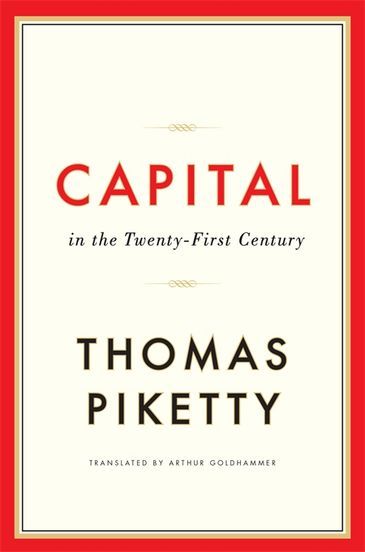French economist Thomas Piketty’s Capital in the Twenty-First Century is an almost 700-page book written by an academic economist, filled with historical statistics and theoretical discussions of “Cobb-Douglas production functions.”
Videos by Rare
And yet, it somehow was the #1 bestselling book on Amazon. What the heck is going on here?
The answer is the conclusion Piketty draws: He wants the governments of the world to coordinate their efforts, sharing financial information among themselves so that no human being on Earth can hide from confiscatory taxes on both wealth and income. It is because today’s self-described “progressives” share Piketty’s hatred for economic inequality that they celebrate his book. Indeed, even his fans admit that Piketty’s analysis suffers from fundamental problems—I’ll document just a few in this review.
But none of that matters, because the memo has gone out: The progressive interventionists are going to focus hard on “inequality,” and Piketty’s book serves as a useful rallying banner for their agenda.
Destructive Envy
The most obvious problem with Piketty’s book is that he wants to make workers poorer, just so long as it will hurt rich capitalists even more. No economist denies that as the stockpile of “capital”—which Piketty broadly defines to include real estate and all forms of non-human wealth—expands, that the absolute wages of the workers will rise. After all, if workers have more tools, machines, and equipment augmenting their labor, they are going to be more physically productive per hour, and hence will be paid more.
Yet the continual increase in the workers’ standard of living is not enough to placate Piketty and his fans. Indeed, Nobel laureate Robert Solow admits that capital accumulation will make the workers better off in absolute terms, but worries that they might be worse off relative to the capitalists.
If Piketty and Solow saw a vision of the future that looked like The Jetsons, they wouldn’t marvel at the unbelievable convenience and luxury that the family enjoys, all provided by George’s two hours of labor per week. No, instead of thanking capitalism for providing flying cars to the average family, instead Piketty and Solow would be complaining about how unfair it was that a short bald guy got to own Spacely Sprockets all by himself.

Blunders, Both Serious and Petty
According to Paul Krugman, those who oppose Piketty’s call for confiscating the wealth of the super-rich can only resort to name-calling. Yet Krugman is as reliable on this topic as he is on VA health care. Piketty’s book is riddled with so many errors that it was difficult for me to choose which ones to highlight in this review.
For starters, a bombshell report just came out in the FT, where Chris Giles alleged that Piketty’s historical data series on wealth concentration are filled with inaccuracies that upset his whole case. We’ll have to wait for the dust to settle on this particular charge. Yet there are a host of other problems.
This is a book about the rate of return capital generates for its owners—the famous “r” that Piketty claims will persistently exceed “g,” the growth in total output. You would think, then, that Piketty would understand the basics of how modern economic theory explains the determination of interest rates and the earnings of capitalists, and that in his 3-page description of a famous professional debate on the issue, that Piketty would manage to tell his readers the debate’s central issue.
Alas, Piketty’s book is bereft of even the simplest understanding of these issues, as both his ideological foes and friends agree.
Because Piketty doesn’t know what drives interest rates, and because he switches from viewing “capital” as a collection of physical things versus a sum of money (even Piketty’s fan Brad DeLong admits both points), Piketty and his readers will end up drawing the wrong conclusions from history.
For example, Mother Jones loved this chart showing income inequality soaring in the late 1920s and in the mid-2000s: Look everyone, if we let the 1% earn too much, it sets the world up for a giant financial crash! But actually what happened is that loose monetary policy drove down interest rates, thereby fueling asset price booms, which showed up as huge income (in the form of capital gains) accruing disproportionately in the hands of the wealthy. It’s not surprising that these Fed-fueled asset bubbles eventually collapsed, leading to the Great Depression and Great Recession. To prevent a repeat, the government doesn’t need to confiscate property from the super-rich; instead the Fed needs to stop inflating asset bubbles.
Another devastating flaw is that Piketty has misread the empirical literature. Piketty needs a certain parameter—“the elasticity of substitution” between capital and labor—to be greater than one, in order to predict that the capitalists will earn a larger and larger proportion of annual income. Yet as Piketty’s fan Larry Summers points out, Piketty ignored depreciation. Once you correct for this simple mistake, Piketty’s whole case goes out the window: Piketty’s framework predicts that workers will see their incomes rise both in absolute terms and relative to the income of the capitalists.
Putting aside these theoretical issues, Piketty is praised chiefly for his historical work. Beyond the bombshell FT allegations mentioned above, we have more mundane (and boneheaded) mistakes: Piketty can’t even correctly tell his readers the presidential administrations during which tax rates were raised or the minimum wage was hiked.
Further, these two mistakes very coincidentally serve Piketty’s political narrative.
Conclusion
After all of the above, you might be tempted to excuse Piketty’s numerous, fatal errors because after all, his goal is to help poor people. Yet as I document elsewhere, the book is filled with shocking quotations making it perfectly clear that Piketty’s proposed taxes are not designed to raise revenue, but instead are designed to prevent people from creating large wealth and incomes in the first place.
I must admit, I learned a lot from reading Piketty’s book. Specifically, I learned how many self-styled progressives today are willing to sacrifice the standard of living of billions of poor people, in order to prevent a few people from becoming really rich.



